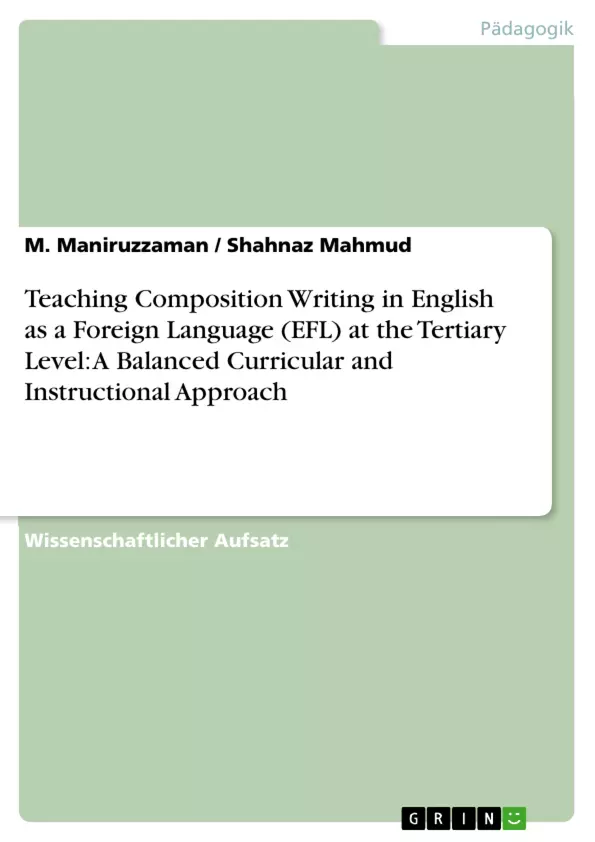This study resulted from concerns about teaching composition writing in English as a foreign language (EFL) at the tertiary level at the universities in Bangladesh since the learners at the level appear to have disappointingly low proficiency in composition writing. It was conducted among 135 undergraduate students, and revealed two major problems in the subjects’ EFL composition writing: linguistic errors and structural anomalies. To solve these problems, the researchers suggest utilizing a balanced curricular and instructional approach, that is, an amalgamation of the product and the process approach to teaching composition writing. Based on the blend of the two approaches to teaching composition writing, this paper advocates some guidelines which can be employed to help improve instruction in and enhance effective learning of EFL composition writing.
Key words: EFL composition writing, tertiary level, low proficiency of learners, concerns about teaching, the process approach, the product approach, a balanced curricular and instructional approach
Inhaltsverzeichnis
- ABSTRACT
- INTRODUCTION
- THEORETICAL BACKGROUND
- The Product Approach
- The Process Approach
- METHODOLOGY
- Participants
- Data Collection
- Data Analysis
- FINDINGS AND DISCUSSION
- Linguistic Errors
- Structural Anomalies
- PEDAGOGICAL IMPLICATIONS
- A Balanced Curricular and Instructional Approach
- CONCLUSION
- REFERENCES
Zielsetzung und Themenschwerpunkte
Diese Studie befasst sich mit der Lehre des Kompositions-Schreibens in Englisch als Fremdsprache (EFL) auf tertiärer Ebene an Universitäten in Bangladesch. Sie untersucht die Herausforderungen, die mit der geringen Kompetenz von Studenten in diesem Bereich verbunden sind, und schlägt einen ausgewogenen Lehrplan und einen pädagogischen Ansatz vor, um diese Probleme zu lösen.
- Analyse der Produkt- und Prozessansätze zum Kompositions-Schreiben
- Identifizierung von sprachlichen und strukturellen Fehlern in EFL-Kompositionen
- Entwicklung eines ausgewogenen Lehrplans und pädagogischen Ansatzes, der Elemente beider Ansätze integriert
- Bewertung der Wirksamkeit des vorgeschlagenen Ansatzes
- Entwicklung von Empfehlungen für die Verbesserung des EFL-Kompositions-Unterrichts
Zusammenfassung der Kapitel
Die Einleitung stellt das Problem der geringen Kompetenz von Studenten in EFL-Kompositions-Schreiben an Universitäten in Bangladesch dar und erläutert die Ziele der Studie. Der theoretische Hintergrund untersucht die Produkt- und Prozessansätze zum Kompositions-Schreiben und ihre jeweiligen Stärken und Schwächen. Die Methodik beschreibt die Teilnehmer, die Datenerhebung und die Datenanalyse. Die Ergebnisse und Diskussionen präsentieren die Ergebnisse der Analyse von Studentenarbeiten, wobei sprachliche und strukturelle Fehler hervorgehoben werden. Die pädagogischen Implikationen schlagen einen ausgewogenen Lehrplan und einen pädagogischen Ansatz vor, der Elemente beider Ansätze integriert, um den EFL-Kompositions-Unterricht zu verbessern. Die Schlussfolgerung fasst die wichtigsten Erkenntnisse der Studie zusammen und gibt Empfehlungen für die zukünftige Forschung.
Schlüsselwörter
Die Schlüsselwörter und Schwerpunktthemen des Textes umfassen EFL-Kompositions-Schreiben, tertiäre Ebene, geringe Kompetenz von Lernenden, Bedenken hinsichtlich des Unterrichts, der Prozessansatz, der Produktansatz, ein ausgewogener Lehrplan und pädagogischer Ansatz.
- Citar trabajo
- Dr. M. Maniruzzaman (Autor), Shahnaz Mahmud (Autor), 2010, Teaching Composition Writing in English as a Foreign Language (EFL) at the Tertiary Level: A Balanced Curricular and Instructional Approach, Múnich, GRIN Verlag, https://www.grin.com/document/152436



